Oh, Mr. Porter! (1938)
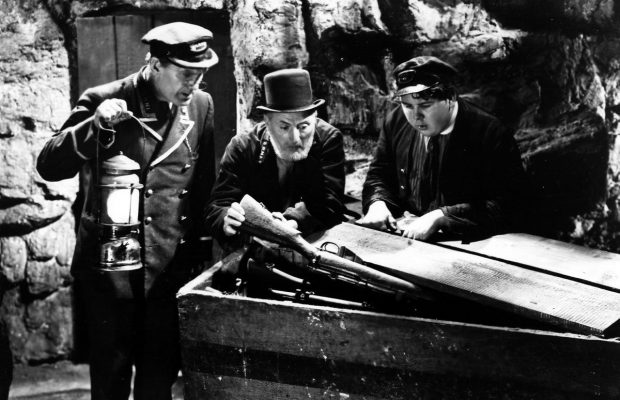
Toronto Film Society presented Oh, Mr. Porter! (1938) on Monday, October 23, 1989 in a double bill with The Wrong Arm of the Law as part of the Season 42 Monday Evening Film Buffs Series “B”, Programme 2.
Production Company: Gainsborough. Producer: Edward Black. Director: Marcel Varnel. Screenplay: Marrcott Edgar, Val Guest and J.O.C. Orton from a story by Frank Launder. Photography: Arthur Crabtree. Musical Director: Louis Levy.
Cast: Will Hay (William Porter), Moore Marriott (Jerry Harbottle), Graham Moffatt (Albert Brown), Sebastian Smith (Charles Trimbletow), Percy Walsh (Superintendent), Dennis Wyndham (Grogan), Dave O’Toole (Postman).
English comedy has from the beginning moved between two poles, infinitely distant from one another: in Shakespeare himself, the comedy of Bottom and his rude mechanicals, and the witty exchanges of Benedick and Beatrice; knockabout physical comedy and internalized verbal comedy; low comedy and high. The Palladium and the Piccadilly proscenium; George Formby singing his suggestive ditties to that even more suggestive ukulele, and the polished epigrams of Kind Hearts and Coronets.
The comedy of Will Hay (1888-1949) mediates between the two poles. As a product of the music hall, he has something of the rough-hewn brashness of a Bottom (but not the adolescent naivete–charming to some–of Formby), and something of the sophistication of high comedy; if not verbal wit, at least something like its visual equivalent, with the low comedy elements projected off on to his asinine assistants (played by Moore Marriott and Graham Moffatt). He is frequently the figure of authority (a schoolmaster, a civil servant, here a station master), though an authority that is itself subversive, so that we can identify with him as a figure of both rule and misrule. In the films in which he played a schoolmaster, he is as prankish as the boys, and like all the great comedians ultimately triumphant, though the other side of him is long-suffering tolerance in the face of their pranks. As the station master in Oh, Mr. Porter!, he owes his hob to his brother-in-law (a classic situation comedy). His power is therefore shaky as well as influential, and he is constantly at the mercy of those still greater incompetents working under him. This duality makes Hay, I think, the supreme British comedian between the wars, subtler than that other great music hall figure George Robey (perhaps best known to today’s audiences through his brief appearance as Falstaff in Olivier’s Henry V), darker than the genial “Big-Hearted Arthur” Askey, less of the moment than Tommy (ITMA) Handley. And that duality is visually evident in Hay’s wonderfully long-suffering and sometimes bewildered appearance (did Alastair Sim model his hangdog Scrooge on this?), matched by his slit-eyed animal cunning, enhanced by the precarious pince-nez.
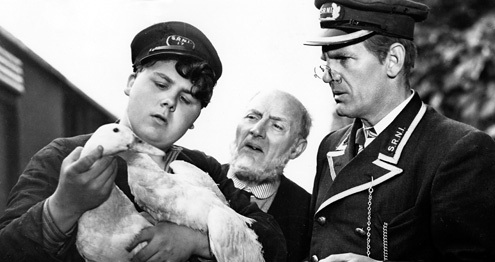
Oh, Mr. Porter! draws on these strengths of Hay’s to make some mordant points about official and bureaucratic inanity, which may be especially topical in a summer when our own government seems about to jettison Via Rail. The best scene in the film may be the one in which Hay and his rude mechanicals argue over the effect of summer time on the arrival of the scheduled train. As they differ very volubly on whether the train will arrive in an hour’s time or no, it suddenly appears, with the inevitability of a bureaucracy when one doesn’t need it, to the disaster of all concerned.
Oh, Mr. Porter! is set in Ireland, in a hamlet with just the right name of Buggleskelly, a town with more than its share of village idiots. The avoidance of work seems to be the main activity, and it keeps the two principal employees of the railway, the fat boy (Moffatt), and the toothless old gaffer (Marriott), very busy indeed. They run the station without government pay, but appropriate for their own purposes any merchandise which is not actually nailed down. Hitherto, they have managed to dispose of a long line of station masters unsympathetic to their activities, and the number of such deposees is testified to by a long line of presentation clocks on the mantelpiece. They find their match–only he can match their incompetence as well as their imperturbability–in Hay.
The way in which Hay moulds these raffish public servants to his own designs is the plot of Oh, Mr. Porter! It is enough to say that it includes the impedimentia of ghosts, gun-runners, incompetent postmen, in short, the gallery of boozy leprechauns we might expect to find in Buggleskelly. The climax of the picture is a dash for Belfast–it has been preceded by a very funny clash with the villains on a windmill, with our heroes riding the sails in the fact of an intermittent, but very definitely malevolent wind. As the train rushes along its rails leaving fire and mayhem everywhere behind it, using every iniquitous device to prevent the villains leaving it, we must be reminded of the climactic sequences of The General. Hay’s total self-service is at variance with Keaton’s patriotism here, but like all the great comedians, by accident or design, Mr. Porter, we know, will fall solidly on his feet at the end. And the comparison with Keaton does no great discredit to Will Hay.
Notes by Barrie Hayne

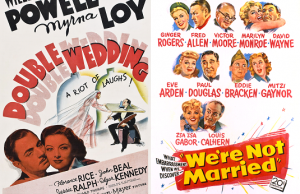
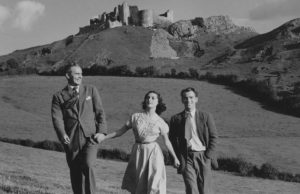
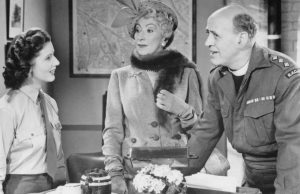






Leave a Reply